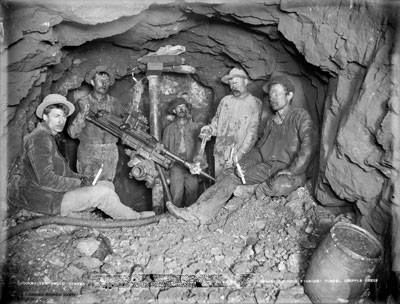Cornwall,
a small peninsula at the southwestern tip of England, was considered the home
of the finest hard-rock miners in the world. They mined tin and smelted it with
copper to produce bronze.
The Bronze Age
began about 2150 BC. Bronze is an alloy of tin and copper, two elements prevalent
in Cornwall. The abundance of those metals plus silver brought the Phoenicians,
Greeks and Romans to England. The Romans referred to England as the Tin Islands
and they actively mined there until the 7th century AD. In the Middle Ages,
mining flourished and laws were established solely to protect the interests of Cornwall and Devon miners because of
the importance of the mining industry to the economy of England. This growth
continued until the mid-19th century.
By the mid-1800s, the mines became so
deep that it was no longer economical to continue operations. That, coupled
with foreign competition, sent Cornwall’s
mining industry into a rapid decline. Cornish miners left for other
countries, including the United States. Miners
began leaving as early as the 1850's. America welcomed over a quarter of
a million Cornish immigrants, or some 20 percent of their population, between
1860 and 1900. In the year 1870 alone,
10,000 Cornish miners immigrated.
The
California Gold Rush of 1849 kicked off the era of mining in the American West,
about the time Cornish miners began leaving Cornwall looking for work
elsewhere. In the early days of
underground mining highly skilled Cornish miners with their unusual language
and brogue were imported to do the work. At the time they led the world in
mining technology and were regarded as the greatest hard rock miners in the
world. Their skill with granite and ore won their fame as the elite laborers of
western mining camps. Heirs of a perfected system of excavation, a valuable
terminology, and the technical edge of a culture immersed in sinkings, stopes,
and winzes, they were the world’s best hard-rock miners.
 |
| Cornish miners in Dolcoath mine - ctsy John Charles Burrow |
Cornish
miners settled in Pennsylvania, Michigan, Wisconsin, Illinois, Montana, South
Dakota, Arizona, Utah, Nevada, and California. Many California communities,
such as Grass Valley and Nevada City, hold events to pay tribute to their
heritage of Cornish miners.
 |
| Cornish Men's Choir in Grass Valley, California - 1916 |
Many
were attracted to Colorado to help strengthen the state’s mining economy.
Starting in the early days of gold mining in Colorado in places such as Central
City until the first decade of the 1900s, Cornish miners found work and
opportunity in the state with its vast mining sources. It is estimated at sixty
percent of miners who worked in the mines of Georgetown and Silver Plume came
from Cornwall.
 |
| Cornish miners inside Cripple Creek mine - 1890 (note steam-powered drill) |
Pioneers
in American mining operations, Cornish miners utilized tribute pay to raise
output and made themselves partners with a grueling industry. Expertise made
them company men, superintendents, captains, and drillers, with their success
dependent almost entirely on their own initiative, coolness, and skill. As a
culture the Cornish miners have survived because the nature of their work
itself gave them a resilience and durability that could be transplanted and
take root outside of Cornwall.
When
a foreman was impressed with his Cornish miner, he would ask if there were any
others like him back in Cornwall. The Cornishman usually would know of other
miners wanting to leave the old country and might answer, “My cousin Jack be a
very good miner and ‘ee should like a new job.” The miners reasoned that
foremen would be more apt to accept another member of the miner’s family, where
in fact, the “Cousin Jack” might not be related at all.
Many
came as single men, but they also came in families. This close-knit band of
miners and their wives were known as “Cousin Jacks” and “Cousin Jennies.” The
name is supposed to come from their habit of addressing one another as “cousin”
and Jack was a common Cornish name.
 |
| Early flash photography of a Cornish miner drill team |
Although
their skill in working with rock and water was soon recognized, the extremes of
weather and temperature, strange sicknesses, the constant danger of accidents,
and the lawlessness of the camps, all made life hard to endure. Many did not
survive to send home for their families, yet the majority persevered to spread
their legendary mining skills and to bring social as well as religious
stability to mining areas that extended from Wisconsin to California.
Although my latest novel, Nathan's Nurse, does not deal with Cornish miners directly, it was through researching the details to write my scenes within the mines I became familiar with just how prevalent Cornish miners were in the silver mines of Colorado where this novel is set.
Nathan's Nurse is now available. To find the book description and purchase link, please CLICK HERE.
Sources:
https://www.reporterherald.com/2019/11/23/colorado-history-cornish-miners-brought-cousin-jacks-to-colorado/
Wikipedia-Cornish
Americans
https://www.flickr.com/photos/lindyannajones/8044700386
http://www.northvalleymagazine.com/cornish-miners-and-tommyknockers/
https://www.oupress.com/books/9783064/the-cornish-miner-in-america
http://darylburkhard.com/cornishminers.html




Great post, Zina. I knew some Welsh were miners but had no idea of the importance of Cornish miners. Such good fodder for our stories! Happy New Year!
ReplyDeleteZina, Thank you for adding to my knowledge of Cornish miners. I did considerable research on them for what was to be my 4th book but vision problems drew me away from writing. The book had to do with a Cornish mining family in Bisbee, AZ in the late 1880's. Arletta
ReplyDeleteThose miners need to be remembered and honored. They did a great deal for this country and by extension themselves. Doris
ReplyDelete